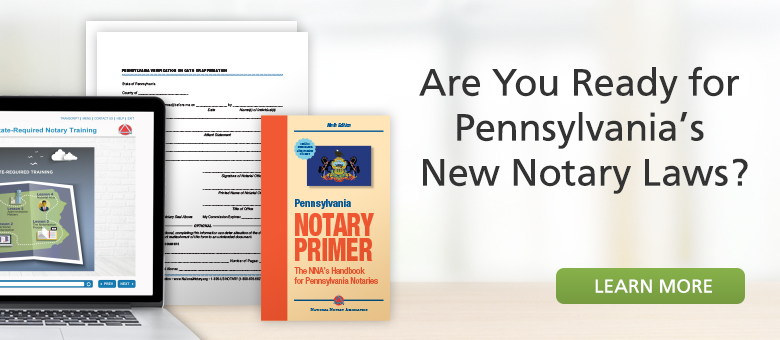Updated 3-13-20. Notaries in the Keystone State have a lot of questions about the new required practices and procedures now in effect. The National Notary Association put together this handy FAQ to help guide you through the transition. If you have a question that does not appear on this list, send it to us at publications@nationalnotary.org.
What is signature witnessing and how is it different from an acknowledgment?
The new Pennsylvania law introduces an additional type of notarial act, witnessing or attesting a signature. Signature witnessing requires the signer to personally appear before the Notary and be identified through personal knowledge or satisfactory evidence. For a signature witnessing, the individual appearing before the Notary is always required to sign the document in the Notary’s presence. The Notary then completes the certificate wording for witnessing a signature as required by section 316 of the new law.
What information must be included in a Notary’s journal under the new law?
Under the new law, a Notary’s physical journal must be a bound book with numbered pages. An electronic journal must be in a tamper-evident format complying with Department of State regulations. The register/journal must include the following information [Section 319]:
1. The date and time of notarization
2. A description of the record and the type of notarial act performed
3. The full name, and the address of each individual for whom the notarial act is performed
4. The method used to identify the signer
5. The fee charged for the notarization
Can I continue to use my current Notary journal under the new law?
You will need to make sure that your current journal meets the requirements of the new law (such as being bound and having numbered pages for a physical journal) and you are able to record all the required information described above. If so, you may continue to use your current journal.
If your journal does not meet the required standards of the new law, you may continue to use it as long as you hold a current commission when the new law takes effect. Once you fill up your journal, you will need to purchase a new, compliant journal.
NNA journals are compliant with the requirements of the new Pennsylvania law.
What PA Notaries need to know about renewing their commissions
After the effective date, every Notary renewing their commission must take an approved education course regardless of their level of experience. Additionally, a renewing Notary who lets their commission lapse even a single day will be required to pass an exam.
Can I still use my current seal and certificates?
If you are commissioned before October 26, 2017, you will be able to use your same seal of office and journal until you renew your commission. The new law includes new notarial certificate forms. You may use these or any other forms that substantially complies with the law. You can obtain the certificates from the Department of State’s website, the NNA, or another authorized vendor.
Why does Pennsylvania’s required Notary course currently focus on the new law (effective October 26, 2017) rather than current law?
In the months leading up to the October effective date, the Pennsylvania required course and test focus solely on the new law. But in the interim, newly commissioned Notaries will be operating under the old law. This is expected to cause some confusion, but the Commonwealth does not want to commission a large group of Notaries who are unaware of the new practices and procedures.
If I follow the new law, will I comply with current law?
Yes, but with a few exceptions. Many of the provisions of the new law comply with or exceed the requirements of current law. However, some new provisions, like the “signature witnessing” notarial act, are not permitted until the October effective date. Also, certifying copies of public records is prohibited under the current law, but will be allowed in the new law.
How do I find out how to comply with current law?
Visit the Pennsylvania Department of State’s What To Know About RULONA information page, Check out the full text of the legislation, or take the NNA’s approved course, or a course authorized by the Department of State.
Phillip Browne is Vice President of Communications for the National Notary Association.

Related Articles:
5 ways the new Pennsylvania law affects how you notarize